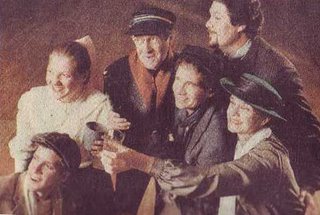Juno & The Paycock

from THEATLANTA JOURNAL CONSTITUTION
THEATER: Theatre Gael's sad, shimmering 'Paycock'
BYLINE: Kathy Janich; Staff
DATE: November 10, 2000
PUBLICATION: The Atlanta Journal and The Atlanta Constitution
EDITION: Home; The Atlanta Journal Constitution
SECTION: Preview
PAGE: Q6
REVIEW
"Juno and the Paycock" Through Dec. 3. 8 p.m. Thursdays-Saturdays; 5 p.m. Sundays. $12-$18. 14th Street Playhouse (Stage 3), 173 14th St. N.E. 404-876-9762, www.arthouse.com/gael.
The verdict: Staged with desperate humor and a big heart by the sons and daughters of Sean O'Casey.
Irish playwright Sean O'Casey once said that "comedy and tragedy step through life together, arm in arm."
And so they do in "Juno and the Paycock" (1924), his vivid recollection of lives lived hard and fast in the slums of Dublin during the Irish civil war.
"Juno," considered the greatest work of one of Ireland's greatest dramatists (1880-1964), is staged with heart and humor by Theatre Gael, which sets it in a snug 85-seat space, then fills the terrain with laughter and tears.
Gael's "Juno" opens with a shot -- a hail of bullets and a frightened, fervant "Hail, Mary." It's immediately clear that this is a dangerous world, one in which friends, neighbors and enemies count only on today, never a tomorrow.
This is the Boyle family's world: put-upon wife Juno (Joanna Daniel), who tries hard to hold the clan together with no help from her boorish, booze-swillin' husband, Captain Jack (Gene Ruyle). Daughter Mary (Lily Yancey), as political as she is pretty, but ultimately suckered by romance. Son Johnny (Nevin Miller), who lost an arm -- and more -- in the fighting, for his spirit seems as crippled as his slender, boyish frame. Into this mix trips Joxer Daly (Gael artistic director John Stephens), the Captain's parasitic, pub-hopping pal. Clearly a man who hasn't seen soap and water in some time, he's both sprite and gremlin.
In the course of O'Casey's two hours, we watch this family implode. Bad times beget good fortune. Good fortune begets more bad times. Separation, desertion and death lurk just beyond the door of their tenement hovel (set by Phil Santora, lights by Brigid Lynn Cappelletti).
The cast, conducted with care by Atlanta actor-director David Crowe, seems to savor the taste and feel of O'Casey's language. As the boastful peacock ("paycock") of the title, Ruyle is a character we both laugh at and loathe, while Daniel is the one we champion. Quiet, powerful work is turned in by Yancey's Mary, and especially Miller as the shaken, shell-shocked Johnny. Only Beth Dalton's Mrs. Madigan registers as false; she's funny enough, but her comic relief could come down a notch in volume (as could the entire show's ear-splitting soundscape).
To O'Casey, who turned to playwrighting after experiencing his homeland as a political rebel, poet, laborer and freedom fighter, "Juno" was a slice of Irish life, a reflection of the human condition as he saw it. Today, to the non-Irish among us, it is historical drama, a glimpse of a time gone by. To the modern-day Irish, it may be a case of the more things change, the more they stay the same. War is still waged on the Emerald Isle, young men still lost. To Gael, which is devoted to Celtic works, it's no doubt a calling. This time the theater answers the herald with a strong, clear voice.
Photo: The cast of Theatre Gael's "Juno and the Paycock" includes (from left) Nevin Miller, Lily Yancey, Gene Ruyle, John Stephens, Winslow Thomas and Joanna Daniel. / STEPHEN BRADLEY / Theatre Gael (Teaser)
FROM CREATIVE LOAFING
Trouble shooters
Tragedy surpasses comedy in Theatre Gael's Juno & Paycock
BY CURT HOLMAN
Written in the early 1920s, Sean O'Casey's Juno and the Paycock takes place in a Dublin tenement during the Troubles. But which Troubles? The rebellion against England in the first decades of the century? The IRA violence of more recent generations? Nobody knows all the Troubles the Irish have seen.
O'Casey's play, in fact, is set in 1922 during the Irish civil war that pit the "Free Staters," who support the treaty with England, against the "Die-Hards," who oppose it. The context of brother vs. brother gives the play a grim and violent backdrop, which stays in focus through the role of a mentally and physically wounded young son, played by Nevin Miller in Theatre Gael's production.
And yet Juno and the Paycock is also a comedy, provoking laughter with situations involving a bickering married couple, boozing loafers and bawdy neighborhood wenches. As in his The Shadow of a Gunman, O'Casey's 80-year-old plays place humor side by side with drama in a way that feels fresh and contemporary to modern audiences. Theatre Gael's staging, however, has more luck with the tragic than the comic.
Juno and the Paycock's shifts in tone reflect the turbulence of life in a 1920s Dublin tenement, where you never know who'll walk in your door. It could be a ruthless, politically motivated terrorist, it could be the grieving mother (Jackie Prucha) of a gunman's victim, or it could be merely an out-of-breath fellow asking "You don't happen to want a sewing machine?" while clutching the appliance to his chest.
We witness these comings and goings from the seedy living room of the Boyles, with mustard-colored walls (designed by Phil Santora) that you can almost smell. Prone to peacock-like pride (hence the title) is "Captain" Boyle (Gene Ruyle), who styles himself like a seasoned mariner, despite avoiding employment and having had little actual maritime experience. His household is kept together by his tough, long-suffering spouse (Joanna Daniel) nicknamed "Juno" for the month of June.
With a no-nonsense wife, a loud, blustering husband and his quirky sidekick (John Stephen's mooching Joxer), the play's dynamic anticipates "The Honeymooners." Juno brandishes a frying pan when Boyle and Joxer sneak in from carousing, while Boyle bemoans his strangely convenient leg pains whenever a job opportunity comes his way. Juno sneers at his show of ill health: "Don't be acting as though you couldn't pull the wings off a dead beetle."
Eking out an existence with their trade unionist daughter Mary (Lily Yancey) and mentally addled son Johnny (Miller), the Boyles see a chance to improve their situation when they get word of a handsome inheritance. Borrowing money against a small fortune they hope to receive, they redecorate their flat, buy new clothes and a phonograph and begin adopting the airs of the nouveau riche. "Hand me that 'attackee' case," Boyle tells Joxer.
Anyone who watches sitcoms will mistrust the prospect of such easy money, and the Boyles will see fate punish them in the second act. Knowing of Mary's romance with a self-taught lawyer (an amusingly self-important Winslow Thomas) and Johnny's involvement with violent agitators primes you to expect the worst. Throughout, Daniel convincingly plays a mother taught by cruel experience to harden her heart, and her despair at the end echoes the mourning mothers of all eras.
Her husband, however, never gets to reveal the same depths of feeling as Juno, which partly reflects how the role is written. Whether faced with angry creditors or plotting mischief with Joxer, Boyle's scenes nearly always play as comic relief to the more serious moments, and consequently Ruyle's work comes across as broad and cartoonish. Ruyle has a good foil in Stephens (who delivers his lines in a high-pitched brogue worthy of Mel Blanc), and Boyle's self-importance and scheming tend to be droll but dramatically slight.
Juno and the Paycock nicely suggests the boisterousness of Irish life, having numerous moments of singing or the recital of poetry. But the Theatre Gael production leaves you less tickled by the antics of Irish men than moved by the plight of the women. The sorrow of O'Casey's piece is quite effective, but as entertainment it's more troubled.
Juno and the Paycock plays through Dec. 3 at Theatre Gael, 14th Street Playhouse, 173 14th St., with performances at 8 p.m. Thurs.-Sat. and 5 p.m. Sun. $12-$16. Call 404-876-9762 for information.


0 Comments:
Post a Comment
<< Home